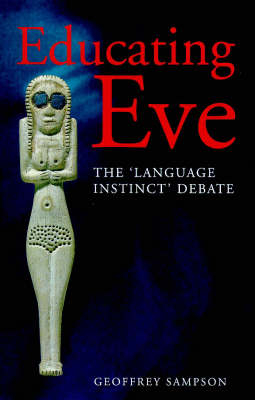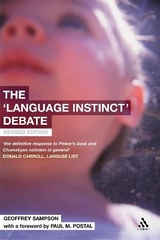
Educating Eve
Language Instinct Debate
Seiten
1999
|
New edition
Continuum International Publishing Group Ltd. (Verlag)
978-0-304-70290-9 (ISBN)
Continuum International Publishing Group Ltd. (Verlag)
978-0-304-70290-9 (ISBN)
- Titel erscheint in neuer Auflage
- Artikel merken
Zu diesem Artikel existiert eine Nachauflage
Are we creatures who learn new things? Or does human mental devel opment consist of awakening structures of thought? This work examines the various arguments for instinctive knowledge and suggests a different picture of learning: that we are born knowing nothing, but able to learn anything.
Are we creatures who learn new things? Or does human mental development consist of awakening structures of thought? A view has gained ground - advocated, for example, by Steven Pinker's book "The Language Instinct" - that language in much of its detail is "hard-wired" in our genes. Others add that this holds too for much of the specific knowledge and understanding expressed in language. When the first human evolved from apes (it is claimed), her biological inheritance comprised not just a distinctive anatomy but a rich structure of cognition. This book examines the various arguments for instinctive knowledge, with the author arguing that each one rests on false premises or embodies a logical fallacy. A different picture of learning is suggested by Karl Popper's account of knowledge growing through "conjectures and refutations". The facts of human language are best explained, Sampson contends, by taking language acquisition to be a case of Popperian learning. In this way, we are not born know-alls; we are born knowing nothing but able to learn anything and this is why we can find ways to think and talk about a world that goes on changing.
Are we creatures who learn new things? Or does human mental development consist of awakening structures of thought? A view has gained ground - advocated, for example, by Steven Pinker's book "The Language Instinct" - that language in much of its detail is "hard-wired" in our genes. Others add that this holds too for much of the specific knowledge and understanding expressed in language. When the first human evolved from apes (it is claimed), her biological inheritance comprised not just a distinctive anatomy but a rich structure of cognition. This book examines the various arguments for instinctive knowledge, with the author arguing that each one rests on false premises or embodies a logical fallacy. A different picture of learning is suggested by Karl Popper's account of knowledge growing through "conjectures and refutations". The facts of human language are best explained, Sampson contends, by taking language acquisition to be a case of Popperian learning. In this way, we are not born know-alls; we are born knowing nothing but able to learn anything and this is why we can find ways to think and talk about a world that goes on changing.
Culture or biology?; the original arguments for a language instinct; the debate renewed; language structure turns Queen's evidence; the creative mind.
| Erscheint lt. Verlag | 1.4.1999 |
|---|---|
| Reihe/Serie | Open Linguistics S. |
| Zusatzinfo | index |
| Verlagsort | London |
| Sprache | englisch |
| Maße | 153 x 234 mm |
| Gewicht | 300 g |
| Themenwelt | Geisteswissenschaften ► Philosophie ► Erkenntnistheorie / Wissenschaftstheorie |
| Geisteswissenschaften ► Philosophie ► Sprachphilosophie | |
| Geisteswissenschaften ► Psychologie ► Allgemeine Psychologie | |
| Geisteswissenschaften ► Psychologie ► Verhaltenstherapie | |
| ISBN-10 | 0-304-70290-0 / 0304702900 |
| ISBN-13 | 978-0-304-70290-9 / 9780304702909 |
| Zustand | Neuware |
| Haben Sie eine Frage zum Produkt? |
Mehr entdecken
aus dem Bereich
aus dem Bereich
die Grundlegung der modernen Philosophie
Buch | Softcover (2023)
C.H.Beck (Verlag)
18,00 €
Buch | Softcover (2023)
Reclam, Philipp (Verlag)
7,00 €



![Was heißt Denken?. Vorlesung Wintersemester 1951/52. [Was bedeutet das alles?] - Martin Heidegger](/media/113619842)